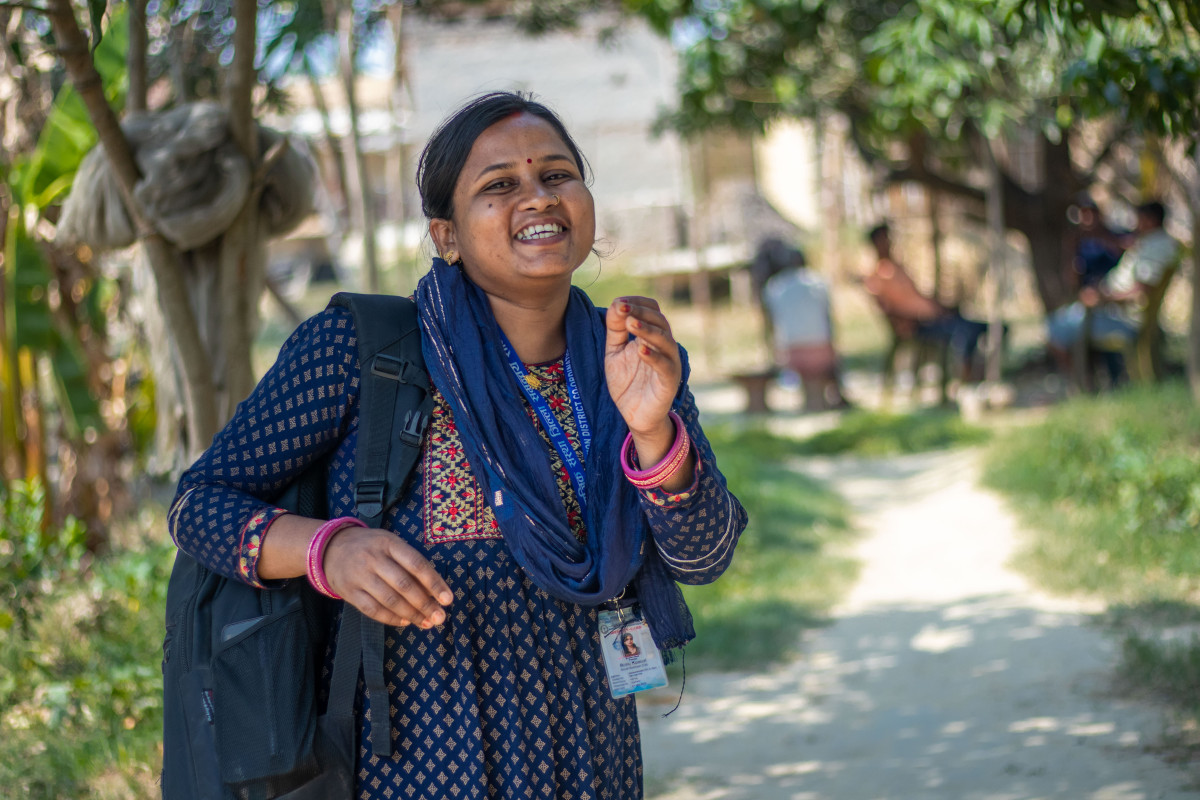“It is not easy for a woman to make a name for herself in society. Our society does not allow that. Even if the family is supportive, society isn’t,” Renu stated at the beginning of our conversation.

Indeed, women from the Terai communities face more struggles than women from other communities. Regardless, all Nepalese women recognise that while women may struggle more in some areas, struggles exist. Heroes like Renu stand up for social change, enlighten their families and society, and inspire many more like them.
Renu Kusuwa, 27, is a ray of hope in her village, advocating for girls' education. She believes they should be able to inquire about and discuss their reproductive health, menstruation, and why child marriage should be discouraged.
She works as a social mobiliser at Social Organization District Coordination Committee (SODCC), under the Aarambha- Leave No Girl Behind project. This project is supported by UK Aid’s Girls Education Challenge programme and led by People in Need in partnership with Aasaman Nepal and SODCC. Renu initially started working there as a project facilitator before being promoted to social mobiliser. She is a survivor of a child marriage herself.
“I got married at the age of 17 while I was studying at the intermediate level. My father wanted me to study further, but my grandfather disagreed,” Renu remembered, continuing, “I knew I had to finish my studies. Still, I got pregnant with my first child within a year of marriage. I somehow managed to pass my second-year exams and give birth. After that, life stopped. Taking care of my children, household duties, and family was my world.” She stopped talking as teardrops started rolling down her cheeks.
After a long pause, Renu gathered her courage again. “At home, you’re always supposed to hide behind the veil. You’re not allowed to speak with anyone, particularly men. In our society, a woman’s place is inside the home and behind a veil. Many cannot even imagine beyond that,” said Renu. That was similar to what we had seen as well. We spent some time around the village before talking to Renu. We had not seen married women working or talking without their veils. But there was Renu in front of us in a Kurta-Suruwal instead of a Sari and without her veil. Such behaviour represents a dare, a sort of resistance, or a significant societal change!
“My father always encouraged me to study. My husband was also always with me. My father-in-law was also supportive, but my mother-in-law disagreed. After the children were a little older, my brother enrolled me to study for a Bachelor in Education. Slowly, my mother-in-law also accepted it”, she recalled.
Supporting Renu's education was an audacious move by her family. This had a direct impact on Renu. “Our society is very negative. You talk to anyone, and they will say that you have been spoilt. Now, to go to college, I had to take off the veil. So, I did, and they started saying all sorts of things about me. But I did not let them bother me. My husband trusts me. Meanwhile, there was a vacancy for a facilitator in a project, and I applied for it and was selected. Then I started working and studying simultaneously.”
Renu's understanding of society deepened while working as a facilitator. She began to engage more with young girls and their families. She started encouraging girls to continue their studies and learn new skills. In the meantime, she became financially independent, too, telling us, “When I was a facilitator, I earned a salary and tried to give some money to my father-in-law. He refused to take it, insisting I keep it for myself. Later, my brother-in-law broke his leg, and I used that money for his treatment.”
Her work as a facilitator made her more confident in this field. Her reputation grew in schools, local communities, local organisations, and elsewhere. Those who once scolded her have now started to respect her. She has become independent, and everyone calls her ‘Ma'am.’
“Even at bigger organisations, they call me ‘ma'am’ now and offer me drinks. I feel very happy. But if my husband had not supported me, I would still be under the veil,” she proudly explains, “One person's company makes a lot of difference in life.”


